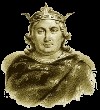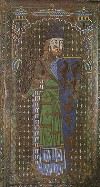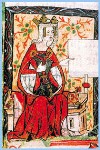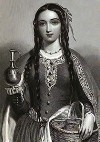My.Family - Ancestors, Descendants and Others
Person Page 645
Grace Lee Chandler 1
1
- Sargent Lineage: Sarah DeEtte Pierce8, Julia Ann Sprague7, John6, Mary Sargent5, Jonathan4, Jonathan3, Jonathan2, John1, William0
Parents
- Father: David Green Chandler (b. 3 March 1847, d. 5 January 1929)
- Mother: Sarah DeEtte Pierce (b. 15 December 1851, d. 5 July 1898)
Biography
- Grace Lee Chandler was born on 23 November 1875 in Fife Lake, Michigan.1
- She died on 22 December 1929 in Traverse City, Michigan, at age 54.1
Other Information
- Relationship: 7th cousin 2 times removed of Linda Sargent
- Charts/Lists: Descendants of William Sargent, Immigrant (#1), Descendants of William Sargent, Immigrant (#2), Lydia Chipman: Mayflower Descendants (#1), Lydia Chipman: Mayflower Descendants (#2)
- Last Edited: 19 September 2024 16:46:29
Citations
Margaret R Reagan1
Family: Kevin Marlin Gosner
Other Information
- Charts/Lists: Descendants of JBS (with spouses), Sargent Family of New Haven
- Last Edited: 27 October 2025 12:45:10
Citations
Aymer Taillefer

 1
1
Biography
- Aymer Taillefer was born about 1160.2
- His title was 'Comte d'Angoulême'.1
- He was also known as Adhémer d'Angoulême.2
- He was a crusader.2
- Aymer married Alice de Courtenay, daughter of Pierre I de France and Elisabeth de Courtenay, about 1186.1,2
- Aymer Taillefer died on 16 June 1202 in Limoges, France, at age ~42.2
Family: Alice de Courtenay (b. about 1160, d. about 1218)
- Isabella d'Angoulême
 + (b. about 1188, d. 31 May 1246)
+ (b. about 1188, d. 31 May 1246)
Other Information
- Relationship: 25th great-grandfather of Linda Sargent
- Charts/Lists: Ancestors of Elizabeth Collier Lewis (#1), Ancestors of Elizabeth Collier Lewis (#2), Ancestors of Ruth Kingsbury (#1), Ancestors of Ruth Kingsbury (#2), Elizabeth Alsop - Royal Ancestors
- Last Edited: 19 September 2024 16:46:29
Citations
Alice de Courtenay

 1
1
Parents
- Father: Pierre I de France (b. about 1126, d. between 1180 and 1183)
- Mother: Elisabeth de Courtenay (b. estimated 1144, d. after 14 September 1205)
Biography
- Alice de Courtenay was born about 1160.2
- Alice married Aymer Taillefer about 1186.1,2
- She died about 1218 at age ~58.1
Family: Aymer Taillefer (b. about 1160, d. 16 June 1202)
- Isabella d'Angoulême
 + (b. about 1188, d. 31 May 1246)
+ (b. about 1188, d. 31 May 1246)
Other Information
- Relationship: 25th great-grandmother of Linda Sargent
- Charts/Lists: Ancestors of Elizabeth Collier Lewis (#1), Ancestors of Elizabeth Collier Lewis (#2), Ancestors of Ruth Kingsbury (#1), Ancestors of Ruth Kingsbury (#2), Elizabeth Alsop - Royal Ancestors
- Last Edited: 19 September 2024 16:46:29
Citations
Pierre I de France

 1
1
Parents
- Father: King Louis VI, King of France 1108-1137 (b. 1081, d. 1 August 1137)
- Mother: Adèle de Savoie (b. about 1092, d. 18 November 1154)
Biography
- Pierre I de France was born about 1126.1
- His title was 'Sire de Courtenay'.1
- In 1147 he was a crusader.1
- Pierre married Elisabeth de Courtenay after 1150.1
- He died between 1180 and 1183.1
Family: Elisabeth de Courtenay (b. estimated 1144, d. after 14 September 1205)
- Alice de Courtenay
 + (b. about 1160, d. about 1218)
+ (b. about 1160, d. about 1218)
Other Information
- Relationship: 26th great-grandfather of Linda Sargent
- Charts/Lists: Ancestors of Elizabeth Collier Lewis (#1), Ancestors of Elizabeth Collier Lewis (#2), Ancestors of Ruth Kingsbury (#1), Ancestors of Ruth Kingsbury (#2), Elizabeth Alsop - Royal Ancestors
- Last Edited: 19 September 2024 16:46:29
Citations
Elisabeth de Courtenay

 1
1
Biography
- Elisabeth de Courtenay was born estimated 1144.2
- Elisabeth married Pierre I de France, son of King Louis VI, King of France 1108-1137, and Adèle de Savoie, after 1150.1
- Elisabeth de Courtenay died after 14 September 1205.1
Family: Pierre I de France (b. about 1126, d. between 1180 and 1183)
- Alice de Courtenay
 + (b. about 1160, d. about 1218)
+ (b. about 1160, d. about 1218)
Other Information
- Relationship: 26th great-grandmother of Linda Sargent
- Charts/Lists: Ancestors of Elizabeth Collier Lewis (#1), Ancestors of Elizabeth Collier Lewis (#2), Ancestors of Ruth Kingsbury (#1), Ancestors of Ruth Kingsbury (#2), Elizabeth Alsop - Royal Ancestors
- Last Edited: 19 September 2024 16:46:29
Citations
King Louis VI, King of France 1108-1137

 1
1

ruled 1108-1137
Parents
- Father: King Philip I, King of France 1060-1108 (b. 23 May 1052, d. 29 July 1108)
Biography
- King Louis VI, King of France 1108-1137, was born in 1081 in Paris, France.1
- He was called Louis the Fat.2
- Louis married Adèle de Savoie about April 1115 in Paris, France.3
- He died on 1 August 1137 in Château Béthizy, Paris, France, at age ~56 or nearby.1
Family: Adèle de Savoie (b. about 1092, d. 18 November 1154)
- Pierre I de France
 + (b. about 1126, d. between 1180 and 1183)
+ (b. about 1126, d. between 1180 and 1183)
Other Information
- Relationship: 27th great-grandfather of Linda Sargent
- Charts/Lists: Ancestors of Elizabeth Collier Lewis (#1), Ancestors of Elizabeth Collier Lewis (#2), Ancestors of Ruth Kingsbury (#1), Ancestors of Ruth Kingsbury (#2), Elizabeth Alsop - Royal Ancestors
- Last Edited: 12 October 2024 15:35:57
Citations
Adèle de Savoie

 1
1
Biography
- Adèle de Savoie was born about 1092.1
- Adèle married King Louis VI, King of France 1108-1137, son of King Philip I, King of France 1060-1108,, about April 1115 in Paris, France.1
- She died on 18 November 1154 at age ~62.1
Family: King Louis VI, King of France 1108-1137 (b. 1081, d. 1 August 1137)
- Pierre I de France
 + (b. about 1126, d. between 1180 and 1183)
+ (b. about 1126, d. between 1180 and 1183)
Other Information
- Relationship: 27th great-grandmother of Linda Sargent
- Charts/Lists: Ancestors of Elizabeth Collier Lewis (#1), Ancestors of Elizabeth Collier Lewis (#2), Ancestors of Ruth Kingsbury (#1), Ancestors of Ruth Kingsbury (#2), Elizabeth Alsop - Royal Ancestors
- Last Edited: 19 September 2024 16:46:29
Citations
Geoffrey V Plantagenet, Count of Anjou

 1
1

1113-1151
Biography
- Geoffrey V Plantagenet, Count of Anjou, was born on 24 August 1113.1
- Geoffrey married Matilda of Normandy, daughter of Henry I, King of England 1100-1135, and Matilda of Scotland, in 1127 in Winchester, England.1
- Geoffrey V Plantagenet, Count of Anjou, died on 7 September 1151 in Chateau-du-Loire, France, at age 38.1
- He was buried in St Julien's Cathedral, Le Mans, France.2
Family: Matilda of Normandy (b. about 1102, d. 10 September 1167)
- Henry II, King of England 1154-1189
 + (b. 5 March 1133, d. 6 July 1189)
+ (b. 5 March 1133, d. 6 July 1189)
Other Information
- Relationship: 26th great-grandfather of Linda Sargent
- Charts/Lists: Ancestors of Elizabeth Collier Lewis (#1), Ancestors of Elizabeth Collier Lewis (#2), Ancestors of Ruth Kingsbury (#1), Ancestors of Ruth Kingsbury (#2), Ancestors of Ruth Kingsbury (#3), Ancestors of Ruth Kingsbury (#4), Elizabeth Alsop - Royal Ancestors
- Last Edited: 3 November 2025 08:51:23
Citations
Matilda of Normandy

 1
1

Empress Matilda/Maude
1102-1167
Parents
- Father: Henry I, King of England 1100-1135 (b. 1068, d. 1 December 1135)
- Mother: Matilda of Scotland (b. about 1080, d. 1 May 1118)
Biography
- Matilda of Normandy was born about 1102 in Winchester, England.1
- In 1110 [Henry V, Holy Roman Emperor, & Matilda] met at Liège before travelling to Utrecht where, on 10 April [1110], they became officially betrothed. On 25 July Matilda was crowned German queen in a ceremony at Mainz. There was a considerable age gap between the couple, as Matilda was only eight years old while Henry was 24. After the betrothal she was placed into the custody of Bruno, the archbishop of Trier, who was tasked with educating her in German culture, manners and government. In January 1114 Matilda was ready to be married to Henry [she was 12], and their wedding was held at the city of Worms amid extravagant celebrations. Matilda now entered public life in Germany, complete with her own household.2
- Henry and Matilda had no children. He died on 23 May 1125 in Utrecht, from cancer.2
- Matilda married Geoffrey V Plantagenet, Count of Anjou, in 1127 in Winchester, England.1
- She died on 10 September 1167 in Rouen, France, at age ~65.1
Family: Geoffrey V Plantagenet, Count of Anjou (b. 24 August 1113, d. 7 September 1151)
- Henry II, King of England 1154-1189
 + (b. 5 March 1133, d. 6 July 1189)
+ (b. 5 March 1133, d. 6 July 1189)
Story
...from Genealogics.org
BIOGRAPHY
Matilda was born in Winchester about 1102, the daughter of Henry I, king of England, and Matilda (Edith) of Scotland. She may have been a twin with her brother William, her father's heir. Diplomacy had her engaged in 1109 to Holy Roman Emperor Heinrich V and she was married to him in 1114 when she was just over eleven years old. Eleven years later the emperor died, leaving her a childless widow.
On 25 November 1120 Matilda's brother William drowned, along with his younger brother Richard and their entourage while crossing the Channel in 'The White Ship', a disaster which was to lead to a bitter struggle for succession following Henry's death in 1135. In 1126 Matilda was declared heir to her father. In the following year he married her off, then about twenty-four years of age, to the fourteen-year-old Geoffrey V, comte d'Anjou. Although apparently somewhat reluctant, she bore him three sons.
When her father died in 1135 Matilda should have become queen-regnant. However, her cousin Stephen de Blois intervened. Though he had sworn to support Matilda, he had himself crowned king on St. Stephen's Day 1135 in London, with the support of its citizens. Pope Innocent II acknowledged Stephen who had bribed a great many of the barons as well as Matilda's uncle, David I, king of Scots to obtain their support. In the ensuing civil war, Matilda was supported by her illegitimate half-brother Robert, earl of Gloucester, who became her military commander. In February 1141, Stephen was captured and imprisoned at Bristol and on 7 April 1141 Matilda was proclaimed 'Lady of the English'. However, Stephen's supporters captured the earl of Gloucester and exchanged him for Stephen. Stephen had himself re-crowned and the civil war continued.
In 1144 Matilda's husband Geoffrey of Anjou took Normandy, and in 1150 he invested their son Henry as its duke. In 1153 Henry, by now twenty years old, took Matilda's place as claimant to the English throne while Matilda retired to Normandy. In 1153 a treaty was signed at Westminster that Stephen would remain king for life but Henry would be his successor. In 1154 Stephen died and Henry succeeded him as King Henry II. Matilda, who remained in Normandy, died at Rouen in 1167.3
from Wikipedia.org....
Empress Matilda (c. 7 February 1102 – 10 September 1167), also known as the Empress Maude,[nb 1] was one of the claimants to the English throne during the civil war known as the Anarchy. The daughter of King Henry I of England, she moved to Germany as a child when she married the future Holy Roman Emperor Henry V. She travelled with her husband to Italy in 1116, was controversially crowned in St Peter's Basilica, and acted as the imperial regent in Italy. Matilda and Henry V had no children, and when he died in 1125, the imperial crown was claimed by his rival Lothair of Supplinburg.
Matilda's younger and only full brother, William Adelin, died in the White Ship disaster of 1120, leaving Matilda's father and realm facing a potential succession crisis. On Emperor Henry V's death, Matilda was recalled to Normandy by her father, who arranged for her to marry Geoffrey of Anjou to form an alliance to protect his southern borders. Henry I had no further legitimate children and nominated Matilda as his heir, making his court swear an oath of loyalty to her and her successors, but the decision was not popular in the Anglo-Norman court. Henry died in 1135, but Matilda and Geoffrey faced opposition from Anglo-Norman barons. The throne was instead taken by Matilda's cousin Stephen of Blois, who enjoyed the backing of the English Church. Stephen took steps to solidify his new regime but faced threats both from neighbouring powers and from opponents within his kingdom.
In 1139, Matilda crossed to England to take the kingdom by force, supported by her half-brother Robert of Gloucester and her uncle King David I of Scotland, while her husband, Geoffrey, focused on conquering Normandy. Matilda's forces captured Stephen at the Battle of Lincoln in 1141, but the Empress's attempt to be crowned at Westminster collapsed in the face of bitter opposition from the London crowds. As a result of this retreat, Matilda was never formally declared Queen of England, and was instead titled "Lady of the English" (Latin: domina Anglorum). Robert was captured following the Rout of Winchester in 1141, and Matilda agreed to exchange him for Stephen. Matilda became trapped in Oxford Castle by Stephen's forces that winter, and to avoid capture was forced to escape at night across the frozen River Isis to Abingdon, reputedly wearing white as camouflage in the snow. The war degenerated into a stalemate, with Matilda controlling much of the south-west of England, and Stephen the south-east and the Midlands. Large parts of the rest of the country were in the hands of local, independent barons.
Matilda returned to Normandy, now in the hands of her husband, in 1148, leaving her eldest son to continue the campaign in England; he eventually succeeded to the throne as Henry II in 1154, forming the Angevin Empire. She settled her court near Rouen and for the rest of her life concerned herself with the administration of Normandy, acting on her son's behalf when necessary. Particularly in the early years of her son's reign, she provided political advice and attempted to mediate during the Becket controversy. She worked extensively with the Church, founding Cistercian monasteries, and was known for her piety. She was buried under the high altar at Bec Abbey after her death in 1167.2
Other Information
- Relationship: 26th great-grandmother of Linda Sargent
- Charts/Lists: Ancestors of Elizabeth Collier Lewis (#1), Ancestors of Elizabeth Collier Lewis (#2), Ancestors of Ruth Kingsbury (#1), Ancestors of Ruth Kingsbury (#2), Ancestors of Ruth Kingsbury (#3), Ancestors of Ruth Kingsbury (#4), Elizabeth Alsop - Royal Ancestors
- Last Edited: 19 September 2024 16:46:29
Citations
Matilda of Scotland

 1
1

Queen consort of King Henry I
c 1080-1118
Biography
- Matilda of Scotland was born about 1080 in Dunfermline, Scotland.2
- She was also known as Edith of Scotland.2
- Matilda married Henry I, King of England 1100-1135, son of William the Conqueror, King of England 1066-1087, and Matilda of Flanders, on 11 November 1100 in Westminster Abbey, London, England.1
- Matilda of Scotland died on 1 May 1118 in Westminster Palace, London, England, at age ~38.1
Family: Henry I, King of England 1100-1135 (b. 1068, d. 1 December 1135)
- Matilda of Normandy
 + (b. about 1102, d. 10 September 1167)
+ (b. about 1102, d. 10 September 1167)
Other Information
- Relationship: 27th great-grandmother of Linda Sargent
- Charts/Lists: Ancestors of Elizabeth Collier Lewis (#1), Ancestors of Elizabeth Collier Lewis (#2), Ancestors of Ruth Kingsbury (#1), Ancestors of Ruth Kingsbury (#2), Ancestors of Ruth Kingsbury (#3), Ancestors of Ruth Kingsbury (#4), Elizabeth Alsop - Royal Ancestors
- Last Edited: 19 September 2024 16:46:29
Citations
Walter Warren Finke1
Biography
- Walter Warren Finke was born on 13 February 1899 in Illinois.1
- Father: Edward H Finke (b 1861) - Mother: Katie Warren (b 1866.)1
- Walter married Pearl Edith Turner, daughter of Edward Alonzo Turner and Emma V Tremain, about 1919.1,2
- Walter Warren Finke was a moulder in an iron steel company.2
- He appeared on the 1930 US Federal Census of 7305 Santa Fe Ave, San Antonio, Los Angeles County, California, enumerated on 10 April 1930. They rent their home for $35. The own a radio. Also listed were Edward H Finke age 64 father and Le Roy Finke age 35 brother.2
- He died on 8 September 1959 in Los Angeles County, California, at age 60.1
- He was buried in Forest Lawn Memorial Park (Glendale), Glendale, California. Plot: Resthaven, Map 1, Lot 53, Space 6.3
Family: Pearl Edith Turner (b. 29 June 1899, d. 28 February 1956)
Other Information
- Last Edited: 19 September 2024 16:46:29
Citations
Return Strong 1
1
Parents
- Father: Return Strong (b. 10 February 1669, d. 6 August 1708)
- Mother: Elizabeth Burritt (b. 7 July 1675)
Biography
- Return Strong was born on 8 January 1703/04 in Stratford, Connecticut.1
- He died on 10 January 1703/04 in Stratford, Connecticut, at age 2 days.1
Other Information
- Relationship: 6th great-granduncle of Linda Sargent
- Charts/Lists: Kingsbury Family
- Last Edited: 19 September 2024 16:48:05
Citations
Joseph Bissell1
Parents
- Father: Thomas Bissell (b. about 1629, d. 31 July 1689)
- Mother: Abigail Moore (b. 14 February 1639/40, d. February 1725)
Biography
- Joseph Bissell was born on 18 April 1663 in Windsor, Connecticut.1,2
- Joseph married Sarah Strong, daughter of Return Strong and Sarah Warham, on 7 July 1687 in Windsor, Connecticut.1,2
- Joseph Bissell died on 23 August 1689 in Windsor, Connecticut, at age 26.1,2
Family: Sarah Strong (b. 14 March 1664/65)
Other Information
- Relationship: 1st cousin 10 times removed of Linda Sargent
- Last Edited: 19 September 2024 16:46:29
Citations
John Higley1
Biography
- John Higley was born estimated 1665.2
- John married Sarah Strong, daughter of Return Strong and Sarah Warham, about 1696.1
- John Higley died on 25 August 1714 at age ~49.1
Family: Sarah Strong (b. 14 March 1664/65)
Other Information
- Last Edited: 19 September 2024 16:46:29
Citations
John Moore1
Biography
- John Moore was born on 26 June 1665.1
- John married Abigail Strong, daughter of Return Strong and Sarah Warham, on 8 February 1693/94.1
Family: Abigail Strong (b. 8 March 1667, d. 1 May 1733)
Other Information
- Last Edited: 19 September 2024 16:46:29
Citations
Nathaniel Boreman1
Biography
- Nathaniel Boreman was born on 12 April 1663 in Wethersfield, Connecticut.1
- Another spelling of his name was Boardman.1
- Nathaniel married Elizabeth Strong, daughter of Return Strong and Sarah Warham, on 30 April 1707.1
- Nathaniel and Elizabeth had 1 child.1
- He died on 29 November 1712 in Wethersfield, Connecticut, at age 49.1
Family: Elizabeth Strong (b. 20 February 1671)
Other Information
- Last Edited: 19 September 2024 16:46:29
Citations
William Warner1
Biography
- William Warner was born on 25 January 1672 in Wethersfield, Connecticut.1
- He was called Captain.1
- William married Elizabeth Strong, daughter of Return Strong and Sarah Warham, on 7 January 1714/15 in Wethersfield, Connecticut.1
- William and Elizabeth had 1 child.2
- He died between 15 October 1726 and 25 November 1726 in Wethersfield, Connecticut.1
Family: Elizabeth Strong (b. 20 February 1671)
Other Information
- Last Edited: 19 September 2024 16:46:29
Citations
Martha Buckland1
Parents
- Father: Nicholas Buckland (b. estimated 1641)
- Mother: Martha Wakefield (b. estimated 1646)
Biography
- Martha Buckland was born on 1 March 1677/78.1
- Martha married Samuel Strong, son of Return Strong and Sarah Warham, on 9 November 1699.1
- Martha Buckland died on 5 December 1770 at age 92.1
Family: Samuel Strong (b. 27 December 1675, d. 11 January 1741/42)
Other Information
- Last Edited: 19 September 2024 16:46:29
Citations
Nicholas Buckland1
Biography
- Nicholas Buckland was born estimated 1641.2
- Nicholas married Martha Wakefield estimated 1676.1,2
Family: Martha Wakefield (b. estimated 1646)
- Martha Buckland (b. 1 March 1677/78, d. 5 December 1770)
Other Information
- Last Edited: 19 September 2024 16:46:29
Citations
Martha Wakefield1
Biography
- Martha Wakefield was born estimated 1646.2
- Martha married Nicholas Buckland estimated 1676.1,2
Family: Nicholas Buckland (b. estimated 1641)
- Martha Buckland (b. 1 March 1677/78, d. 5 December 1770)
Other Information
- Last Edited: 19 September 2024 16:46:29
Citations
Mary Strong1
Parents
- Father: Return Strong (b. 9 April 1640, d. 9 April 1726)
- Mother: Margaret Newberry (b. 23 October 1662, d. 1703)
Biography
- Mary Strong was born estimated 1689 in Windsor, Connecticut.2,1
- She never married.1
- She died on 28 October 1708 at age ~19.1
Other Information
- Relationship: 7th great-grandaunt of Linda Sargent
- Last Edited: 19 September 2024 16:46:29
Citations
Samuel Chapman1
Biography
- Samuel Chapman was born on 2 March 1695/96 in Windsor, Connecticut.2
- Father: Simon Chapman (b 30 Apr 1669 Windsor, CT) - Mother: Sarah UNKNOWN.2
- Samuel married Hannah Strong, daughter of Return Strong and Margaret Newberry, on 8 August 1717.1
- Samuel and Hannah lived in Windsor, Connecticut.3
- In 1726 Samuel and Hannah moved to Tolland, Connecticut, with their family.3
- Samuel and Hannah had 8 children.3
- He was the Captain of the 9th Connecticut Company at the Seige of Louisbourg in the French and Indian War in Cape Breton, Nova Scotia.3
- He died in January 1745/46 in Louisbourg, Nova Scotia, Canada, at age 49 during the French War.4
Family: Hannah Strong (b. 8 May 1692)
Other Information
- Last Edited: 19 September 2024 16:46:29
Citations
Noah Sparks1
Biography
- Noah Sparks was born estimated 1696.2
- Noah married Margaret Strong, daughter of Return Strong and Margaret Newberry, on 29 July 1736.1
Family: Margaret Strong (b. 28 April 1699)
Other Information
- Last Edited: 19 September 2024 16:46:29
Citations
Thomas Welles 1
1
Parents
- Father: Thomas Welles (b. 1627, d. 1668)
- Mother: Anne Tuttle (b. about 1623)
Biography
Other Information
- Relationship: 8th great-granduncle of Linda Sargent
- Charts/Lists: Lewis Family
- Last Edited: 19 September 2024 16:46:29